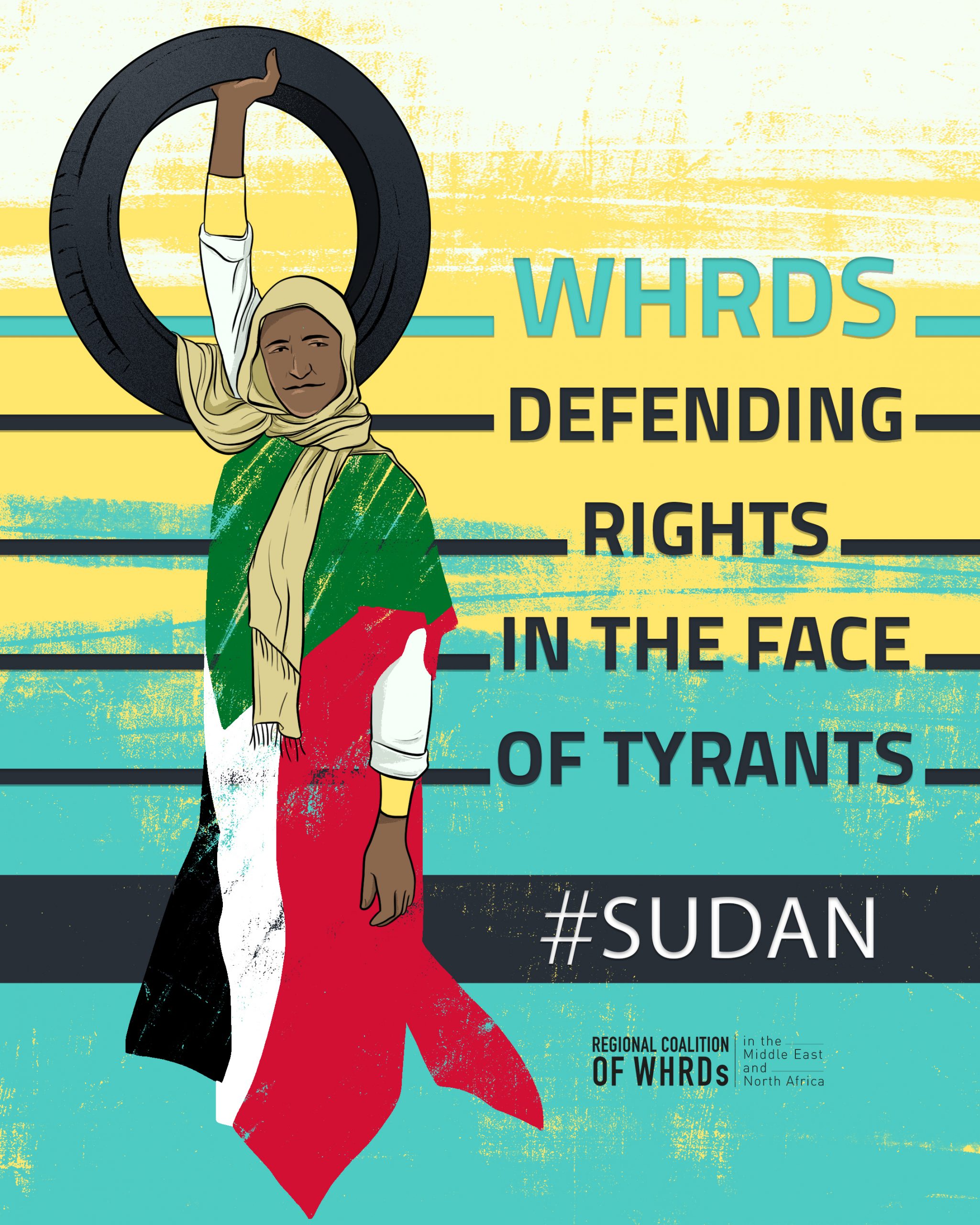
Iran: Human Rights Council must convene a special session
Fifty organisations urge the UN Human Rights Council to urgently convene a special session to address an unprecedented escalation in mass unlawful killings of protesters in Iran.
© Photo: MENA WHRD Coalition

As we celebrate the International Day for Ending Violence Against Women and WHRDs Day during the 16 days of activism to End Violence Against Women, we salute the courageous Sudanese women fighting for freedom and equality. We stand in solidarity with their struggle for democratic change, justice and peace.
On 17 November 2022, security forces threw a 24-year-old woman protester from a bridge in central Khartoum. She sustained serious injuries that required 4 surgeries to her spine. Since the military coup of 25 October 2021, violence against women and women human rights defenders (WHRDs) has increased and it is threatening their ability to participate in the public space.
Since early November at least two women volunteers in charity groups have been facing legal prosecution following unfounded accusations of collecting money to support protest movements. A female journalist in West Darfur was threatened and subjected to a smear campaign in a public statement by the State governor for publishing news about schools in the State. Women lawyers have been beaten and suffocated by tear gas during continuous police attacks inside Sudanese Bar Offices in Khartoum.
In October 2022, violence erupted in the areas of Blue Nile, in Lagawa in West Kordofan and in Central Darfur. The government’s Humanitarian Aid Commission (HAC) reported that an estimated 15,000 people—mostly women and children—fled the violence in central Darfur. Zubaida Eisa, a 30-year-old woman teacher and farmer, was killed by armed militias in Kadugli Nuba Mountains/South Kordofan. She was shot dead on 20 November 2022 while defending herself and another woman farmer against the armed men who attempted to rape both women. Women farmers in conflict areas are facing intensifying violence that includes killing, injuries and rape in armed militia’s attacks while farming or fetching water and wood. This rising violence has heightened food insecurity for millions of women and children in these areas. According to WFP and Humanitarian aid groups, over 11 million in Sudan are facing food insecurity or hunger this year, mostly women and children.
According to UNFPA, 2.7 million women and girls in Sudan are in need of gender-based violence protection, mitigation and response services. These numbers are estimated and subject to major increase due to the escalating violence against women and WHRDs in Sudan. Women rights groups have limited capacity to document and monitor the expanding violence against women in the last year. Domestic violence and “honor crimes” have been on the rise in recent years. In Darfur, 5 girls were killed last month by their male family members for talking on the phone. In Khartoum alone, over 20 domestic violence cases are reported daily in one locality. But there is a lack of sufficient support and protection networks for victims across the country.
Freedom of expression and association for women is restricted under the coup authorities. In Zalinji in Central Darfur, the journalist Hafida Abduallh was arrested while covering a protest organised by women street vendors. She was prevented from filming and reporting about the protest. Women rights groups across Sudan are leading the democratic movement while facing unprecedented violence. Women members in professional unions are being punished for participating in protests and public strikes. WHRDs and feminist activists struggling with social media smearing campaigns and online harassment organised by the coup supporters and Fundamental Islamists.
Prioritisation of accountability and transitional justice are essential factors to end violence against women in Sudan. The ongoing efforts to reinstate democratic transition in Sudan must ensure women participation in the building of the processes of justice, accountability and State reforms. Security sector reforms, justice system reforms and peace implementation are key principles to build a democratic State and enhance the efforts to end violence against women in Sudan. Women rights in Sudan are deteriorating under the increasing militarisation of the State. The closure of civic space and restrictions of freedoms of assembly, association and expression are threatening the ability of women groups and WHRDs to work under these hostile conditions.
As we celebrate the International Day for Ending Violence Against Women and WHRDs Day during the 16 days of activism to End Violence Against Women, we salute the courageous Sudanese women fighting for freedom and equality. We stand in solidarity with their struggle for democratic change, justice and peace.
We the undersigned groups and organisations call on :
Signatories:

Fifty organisations urge the UN Human Rights Council to urgently convene a special session to address an unprecedented escalation in mass unlawful killings of protesters in Iran.

In a landmark ruling against Burundi, the UN Committee against Torture has set a precedent on the protection of lawyers and human rights defenders engaging with UN mechanisms, affirming that reprisals for cooperating with the UN violate the Convention Against Torture.

UN human rights mechanisms examined the situation in Guatemala regarding the right to adequate housing and racial discrimination, calling for an end to forced evictions against Indigenous communities and for the protection of land defenders, including Indigenous Peoples.